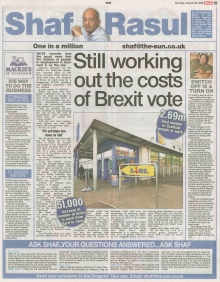Last week came the good news that the number of people in employment north of the border is on the rise.
Figures released by the Office for National Statistics showed that in the three months from April to June this year, the number of Scots in work rose by a staggering 51,000, marking the highest quarterly rise on record.
It now stands at 2,629,000.
While the buzz was tempered somewhat by the fact that the spike is thought to have been brought about in part by an unusually low previous employment estimate, there are undoubtedly some real positives to pick out.
Take, for example, the fact that Scotland is outperforming the rest of the UK both in employment and unemployment rates for women and young people. And the fact that employment figures are now well above the pre-recession high.
So far, so good.
Yet, no matter how encouraging the figures are at face value, in reality the business community is less interested in stats from the first half of the year than it will be in the second, as it waits anxiously to find out if the Brexit vote has had any impact.
For now, it’s perhaps still too soon to tell. While last week’s survey from the Scottish Retail Consortium showed retail sales slipped again in July by 1.8 per cent—the second decrease in two months—the Consortium’s director David Lonsdale says it’s ‘too early’ to consider the figures a ‘barometer of the Brexit vote impact’. Instead, he reckons poor weather is to blame.
Credit ratings agency Moody’s also released its quarterly report on the outlook for the global economy and warned that Brexit-fuelled uncertainty will trigger a slowdown in both business investment and consumer spending as the year progresses.
But there is still good news out there.
We can take some comfort in the fact that it is business as usual at Lidl, which is continuing to invest in its Scottish workforce.
The German giant has experienced phenomenal success in recent years and last week we heard about more potential jobs in the pipeline with a planned distribution centre at Eurocentral in Lanarkshire.
The move from its current Livingston warehouse would not only see existing jobs transferred, but will create 100 new roles.
With 91 outlets in Scotland, Lidl will now be submitting its planning application with the hope of starting onsite in 2017, if the project is approved.
Elsewhere, outwith the Brexit bubble, the last seven days brought further jobs news, including some bad news from tech giant Cisco, which announced it is slashing 5,500 jobs from its global workforce as the company shifts its core offering from hardware to software.
Given there are relatively few Scottish-based employees, with just 150 people working in sites in Edinburgh and Motherwell, we’ve yet to see how the announcement will affect Scottish roles.
Again, only time will tell.
So, for now, it’s a bit of a waiting game. Business as usual with a side of uncertainty.


